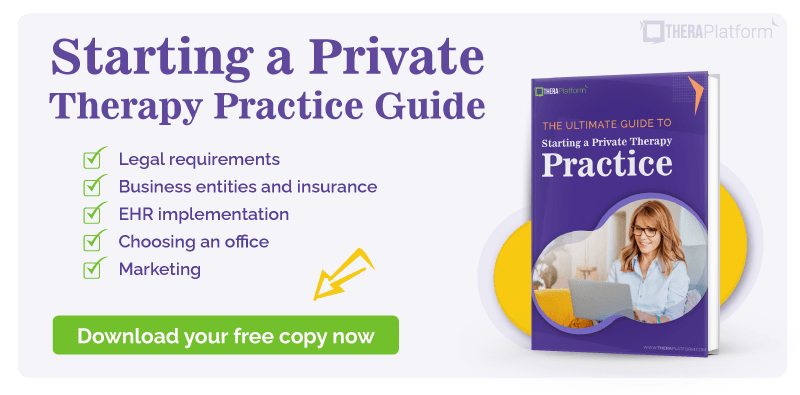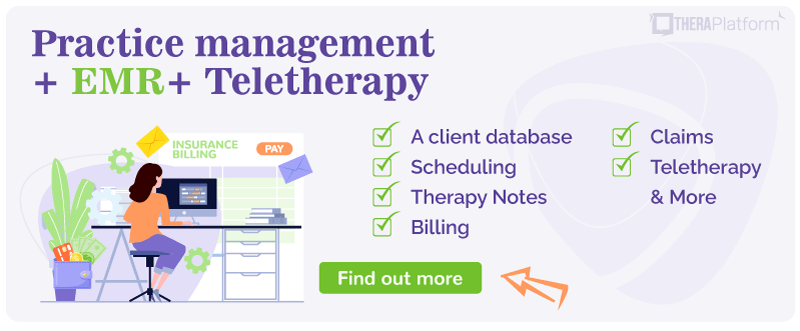Private practice therapist: identifying your ideal client

So, you’ve made the decision to become a private practice therapist. But where to begin? How best to connect to the right client? The process of growing into a successful mental health, occupational, physical or speech therapy private practice can be intimidating as many decisions need to be made and many problems need to be solved. A key place to start is determining what issues you want to address and who your ideal clients are. This important step begins with investigation and research to help you find your niche. Once you narrow down your niche you can hone in on how to connect to the best clients.
What is a niche?
A niche as a private practice therapist is the specific client population that you to treat and consists of many factors such as:
Unique treatment needs
- Pain points
- Clinical issues
- Diagnoses
- Treatment modality
- Demographics
- Age
- Gender
- Geographic location
- Community
- Religion
Some private practice therapists choose a broader niche such as anxiety. Other private practice therapists develop much more specific niches such as treating obsessive compulsive disorder in millennial women with cognitive behavioral therapy. As the practice grows and the clinician gains experience, the private practice therapist may focus on more than one niche.

Why have a niche in your therapy private practice?
Defining your niche will likely lead to more success in targeting your clinical focus on whom you treat, what you treat, and how you treat clients. This specific focus provides many advantages.
With a defined niche, you can invest your training time and dollars into a specific targeted treatment area or population. Focus on selecting workshops, continuing education, research, books, etc., specific to your niche. Doing so allows you to build and strengthen your expertise and the stronger your expertise, the better your client outcomes.
When you have a clear niche, you can more clearly speak to your ideal client in your marketing efforts. Marketing not only helps you to reach your target client but also helps your ideal client find you. With a specific defined client base, you can write clear, concise, and consistent messages in your marketing efforts which will help you find and connect with the right client.
Some ways a niche-based marketing approach helps your client includes:
- Making it easier for the right client to find you when searching online.
- Speaking directly to clients’ pain points that they want addressed in counseling.
- Giving you a voice with more authority and expertise which increases your client’s comfort. and confidence in selecting your service, and, in attending the first appointment.
Making the decision to start therapy and searching for a private practice therapist can be overwhelming for many people. When a potential client visits your website, social media, or directory listing and can easily identify that your services match their needs, you have made the process and decision making easier and less stressful. Consequently, the right client is more likely to connect with you and engage in therapy.
How to pick a niche in your therapy private practice
Defining your niche requires inner exploration, investigation, and research. Conduct market research and learn more about needs in your community and current services offered by other private practice therapists.
Some helpful questions to ask yourself are:
- What are the areas of treatment you feel excited about?
- What education and training do you have?
- What do you enjoy doing in therapy?
- What are you good at doing?
- What populations do you have experience and knowledge in treating?
- What are the needs in your community?
- Who do you enjoy working with?
- Can you offer a unique or specialized way to help a certain niche?
- Does this niche allow you the ability to expand your practice or services in the future if you desire?

Download free private practice checklist

How can I help the right clients in my private practice?
Most clinicians want to provide therapy to help improve people’s lives in some way. When becoming a private practice therapist, you may struggle with how you can best help your clients. By narrowing down your niche, you can gain clarity on how to best help your clients. Considerations for private practice therapists include how you’ll deliver your services, the types of services you offer and whether you’d like to provide group therapy.
Start 30-day Free Trial and explore TheraPlatform. HIPAA Compliant Video and Practice Management Software for Therapists.
Telehealth for private practice therapists
Before COVID, private practice therapy was offered in an office setting but circumstances changed the way counseling practices operated and telehealth has become more mainstream.
Many private practice therapists now offer virtual sessions as part of their services. As a clinician, you have options in how you want to see your clients. In the office? Telehealth? A hybrid model? Making this decision on providing services via telehealth or in office is an important step in connecting with the right client. Some niches may not be appropriate for a telehealth option and others may thrive in this format. As you settle on this decision, the proper practice management system can help you to work with your clients in a HIPAA compliant telehealth platform.
Treatment options for private practice therapists
Sometimes offering a unique service to your clients can help to make treatment more successful. Unique services make it easier for your ideal clients to connect with you and remain consistent in treatment. Some unique services include:
- Home visits
- Classes
- Anger management
- Parenting
- Differing hours of availability for your practice
- Early morning
- Evening
- Weekend
- Specialized treatment interventions
- EMDR
- Hypnosis
- Tapping
Group therapy for private practice therapists
Group therapy sessions can offer another format to help create and maintain a connection to the right client. Group therapy can serve as a positive and beneficial way to help your clients but some niche groups may struggle in this format. As a treatment provider, you have training and experience in group therapy and can offer it as a unique service in your practice. As you identify your niche, consider if group therapy would be an appropriate method to reach your niche.
Clinicians need to weigh, research, consider, and explore many options when transitioning to the role of private practice therapist. One of the most crucial decisions is figuring out your niche, which serves as the foundation for connecting with the right clients and building a success counseling practice.
Offering telehealth services to your clients can help you reach your specific client base by expanding your services outside of local geographic areas. Software like TheraPlatform offers an intuitive, HIPAA-compliant video conferencing platform along with EHR that can make launching your private practice therapy business a breeze. TheraPlatform, an all-in-one EHR, practice management and teletherapy tool was built for therapists to help them save time on admin tasks. Sign up for a free, 30-day trial with no credit card required. Cancel anytime.
Sources
- Benefits and Limitations of Group Therapy. (2019, April 6). Institute of Counselling Blog. Accessed June 30, 2022.
- Find Your Mental Health Niche to Supercharge Practice Growth. Brighter Vision. Accessed June 30, 2022.
- Why You Should Choose Niche in Private Practice. Therapist Site Toolbox. Accessed July 1, 2022.
Resources for your therapist private practice
- Offline Marketing Strategies for your Teletherapy Services
- Online marketing strategies for your Teletherapy Services
- Therapy office
- Therapy Office Decor Must-haves
More resources
- Therapy resources and worksheets
- Therapy private practice courses
- Ultimate teletherapy ebook
- The Ultimate Insurance Billing Guide for Therapists
- The Ultimate Guide to Starting a Private Therapy Practice





